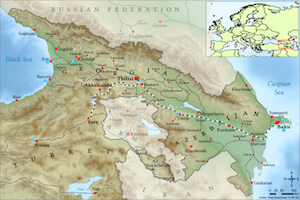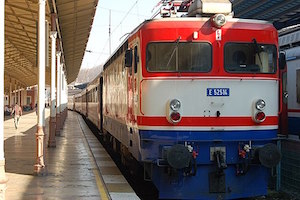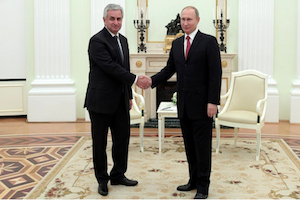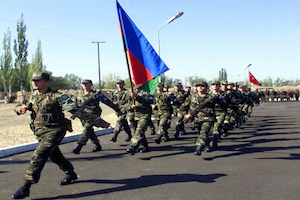Kazakhstan, Georgia and Azerbaijan Support Spain's Integrity
By Stephen Blank
December 13, 2017, the CACI Analyst
Recently, Kazakhstan, Georgia and Azerbaijan proclaimed their support for and recognition of Spain’s territorial integrity. These announcements were obviously triggered by the outbreak of the crisis around Catalonia’s independence referendum. While Spain’s political destiny is hardly a vital interest for these governments, they do worry about the continuing episodes of minority unrest that could furnish precedents for the dissolution of other multi-ethnic or multi-confessional states like them. On this point, these three governments, probably along with all the others in what used to be the Soviet Union, have justified reasons for concern.

Baku-Tbilisi-Kars Railway to Become Central Asia's Gateway to Europe
By Fuad Shahbazov
December 7, 2017, the CACI Analyst
On October 30, 2017, Azerbaijan’s President Ilham Aliyev, along with Turkey’s President Recep Tayyip Erdogan, Georgia’s Prime-minister Giorgi Kvirikashvili, Kazakhstan’s Prime Minister Bakytzhan Sagintayev, and Uzbekistan’s Prime Minister Abdulla Aripov attended the opening ceremony of the long-delayed Baku-Tbilisi-Kars (BTK) railway. “The opening of the railway is of historic and strategic significance,” Aliyev said at the ceremony in the Caspian port city of Alat, south of Baku, to mark the departure of the first trains. In fact, the opening of the new railway provides an alternative route to existing rail services carrying goods from Asia to Europe.

Will the Lapis Lazuli Railway Corridor Finally End Afghanistan's Isolation?
By John C. K. Daly
December 1, 2017, the CACI Analyst
On November 15 during the 7th Regional Economic Cooperation Conference on Afghanistan (RECCA-VII) in Ashgabat Turkey, Afghanistan, Turkmenistan, Azerbaijan and Georgia signed an agreement providing for a major international trade and transport corridor stretching from Turkey to Afghanistan via the post-Soviet Central Asian republics, named the “Lapis Lazuli Corridor.” While many practical problems remain, the development and operation of such a railway corridor has enormous implications for the countries along its route, particularly Afghanistan.

Tensions Remain around Georgia's Breakaway Regions Nine Years After Five-Day War
By Natalia Konarzewska
October 26, 2017, the CACI Analyst
In August, Georgia commemorated the ninth anniversary of its five-day war with Russia over the breakaway regions of Abkhazia and South Ossetia and the 25th anniversary of the war in Abkhazia. Although years have passed since the hostilities, the conflicts remain unresolved while the political situation around the two de facto entities as well as Russia-Georgia relations remain tense. Russia’s President Vladimir Putin visited Abkhazia and reiterated Russia’s military support for the region. In the preceding months, Russia increased its military pressure on Georgia by conducting large-scale military exercises in South Ossetia and Abkhazia. In parallel, Russia continues the illegal demarcation of the so-called frontier between Georgian-controlled territory and the separatist regions, moving the occupation line further into Georgian territory.

Revitalizing the Military Dimension of the Azerbaijan-Georgia-Turkey Tripartite Partnership
By Ilgar Gurbanov
July 24, 2017, the CACI Analyst
On May 23, the defense ministers of Azerbaijan, Georgia and Turkey (AGT) held a trilateral meeting in Batumi, followed in June by the joint trilateral field training Caucasian Eagle 2017 of the three countries’ Special Operations Subdivisions in Georgia’s Vaziani base. The negative impact of terrorism and aggressive separatism on stability and development in the region makes it necessary to pool the capabilities of these countries to confront potential threats directed against their security and sovereignty. The AGT tripartite partnership has proven more successful than other regional integration blocs and initiatives.



